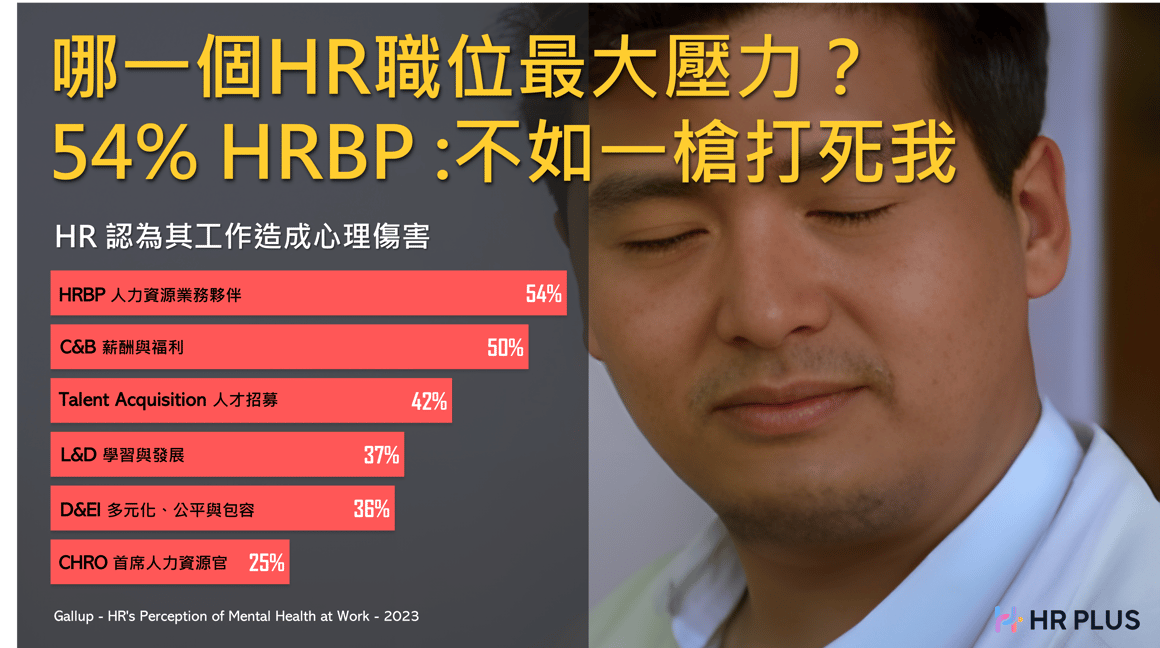[員工健康] 哪一個HR職位最大壓力? 54% HRBP 不如一槍打死我

HR領導是否真正理解他們團隊的壓力水平?最近的一項Gallup調查揭示了其中的的落差。儘管73%的CHRO評價他們的員工心理健康為不錯至優秀,但僅有38%的HR專業人員認為自己的工作對心理健康有積極影響。這種落差突顯出領導認知與員工實況之間的鴻溝,亦引出了我們的疑問:哪個HR職位承受的壓力最大呢?
🌟HRBP和C&B 壓力山大😰
調查顯示,心理健康影響在不同HR間呈現鮮明差異。人力資源業務夥伴(HRBP)的消極程度高達54%。由於角色模糊不清,HRBP普遍感到不知所措,因此希望上級能簡化職責。而薪酬和福利(C&B)專業人員亦普遍感到焦慮,有50%表示工作引致負面情緒。大部份 C&B 專家認為他們的公司沒有為未來的福利計劃做好準備,只有9%持相反意見,而認同他們目前的福利計劃為優秀的只有17%。
🌟人才招聘對自己的工作一言難盡😶
人才招聘就工作是否對心理健康造成負面影響意見不一,42%對自己的工作感到樂觀,但同樣有42%認為工作處於困局。其中,公司科技落後和招聘知識不足是主要原因,僅有19%認為公司的人才招聘科技具有競爭優勢。而16%認為他們具備所需知識招聘公司需要的關鍵人才。
🌟DE&I 及 L&D 感到樂觀😄
不同的是,多元化、公平和包容性(DE&I)專業人員對自己的工作感到樂觀,有60%報告工作對心理健康有積極影響。他們普遍認為DE&I工作授予的道德使命,更令人鼓舞的是,59%的CHRO計劃在2024年增加DE&I的預算。同樣地,學習和發展(L&D)專業人員也大多抱持樂觀的看法,有50%感受到工作對心理健康的積極影響。儘管如此,有23%的L&D表示擔憂在經濟不景氣的情況下,來年預算可能會削減。
🌟HR 壓力較其他員工為甚😔
調查亦對比了HR和一般員工對於工作對心理健康的影響。值得關注的是,44%的HR 表示工作對心理健康帶來負面影響。然而,當一般員工被問及相同問題時,只有40%的人承認存在負面影響。這一發現顯示出HR的壓力比其他同事更大,同時揭示了HR在公司角色上所面臨的挑戰。
🌟CHRO視工作與生活平衡為人才外流的三大因素之一 🏃♂️💼
雖然CHRO與HR團隊存在認知鴻溝,但CHRO亦有察覺到心理健康嚴重加劇人才流失,並積極追求解決之道。其中,有44%的CHRO將工作與生活平衡視為人才外流的第三大主因,僅次於薪酬(77%)和職業發展(76%)。值得鼓舞的是,93%的CHRO 計劃為員工提供更多心理健康相關的活動和服務,以表明對全面員工福祉的承諾。
___________________________________________________________________________________________________________________
Which HR Roles Are Rocking the 'Most Stressful' Title in the HR functions?
Ever wondered if HR leaders grasp their teams' stress levels? A recent Gallup Survey exposes a significant disconnect. While 73% of CHROs rate their workforce's mental health as good to excellent, only 38% of HR professionals view their own job's impact on mental health as somewhat positive. These revelations highlight the gap between leadership perception and employee reality, prompting us to ask: which HR function carries the highest stress load?
🌟HRBP is the most stressful, following C&B 😰
The survey reveals notable differences among HR communities in terms of mental health impacts. HR Business Partners (HRBPs) experience the highest negativity at 54%. Overwhelm is widespread among HRBPs due to ambiguous roles, leading to a call for simplified responsibilities. Compensation and Benefits (C&B) professionals show worries with 50% reporting negativity. Merely 9% of C&B professionals believe their company is prepared for future benefits programs, while 17% rate their current program as excellent.
🌟Talent Acquisition has mixed feelings 😶
Talent Acquisition Leaders display a divided sentiment regarding their role's impact, with 42% experiencing positivity and an equal 42% noting negativity on their mental health. However, a mere 19% perceive their talent acquisition technology strategy as a competitive edge in key talent markets. Similarly, only 16% find their recruiters equipped with the essential capabilities to excel in these crucial talent domains.
🌟DE&I and L&D are more positive 😄
On the other hand, Diversity, Equity & Inclusion (DE&I) professionals exhibit optimism, with 60% reporting positive mental health impact. These leaders embrace the moral significance of their work, and a promising 59% of CHROs intend to boost DE&I budgets in 2024. In addition, Learning and Development (L&D) professionals maintain a balanced view, as 50% observe positive mental health impacts. While L&D roles hold significance within the organization, a notable 23% indicate budget reductions.
🌟HR Professionals are more stressful compared to other employees 😔
The survey delved into the impact of jobs on mental health for both HR professionals and the wider U.S. workforce. Notably, 44% of HR professionals cited a negative mental health impact. Conversely, when the same query reached a representative U.S. workforce sample, only 40% acknowledged a negative impact. These findings underscore that HR professionals face heightened stress levels compared to their counterparts, shedding light on the challenging nature of their roles.
🌟CHRO recognizes the significance of work-life balance🏃♂️💼
In the midst of the divide between leadership perception and employee reality, CHROs demonstrate a keen awareness of the influence of mental health on turnover, actively pursuing remedies. Examining the reasons behind turnover, 44% of CHROs highlighted the significance of work-life balance and flexibility—standing third after compensation (77%) and career development (76%). Importantly, 93% of CHROs confirm their company's commitment to readily available mental health support services, indicating a positive commitment to comprehensive employee well-being.
